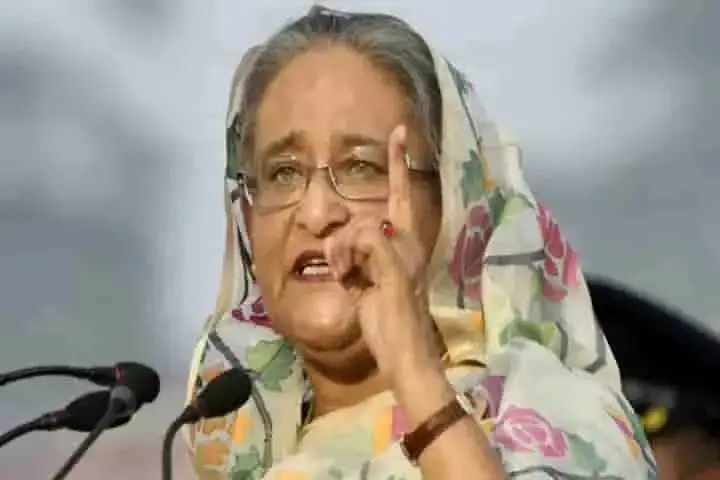

Bangladesh Prime Minister Sheikh Hasina
India must up its ante as Bangladesh’s opposition parties including the Bangladesh Nationalist Party (BNP) are now gearing up to hold rallies and processions and even blockade the country in a bid to oust the current Sheikh Hasina led Awami League government.
Bangladesh Prime Minister Hasina yesterday said in Parliament that the opposition parties are trying to stir up political instability in her country. “When the country is in a transition period (crisis), I’ve not seen such concern among those who are in our opposition. Rather I’ve seen that they are trying how to create a political instability, taking its advantage. Is it fair to do that?” she said.
Amanullah Aman, senior member of the BNP said on October 8 that his party is planning to launch a new programme across the country targeting the government.
“If necessary, we will be martyrs but no election under [Prime Minister] Sheikh Hasina will be allowed. We will return home after ensuring the removal of this government,” Aman said.
Earlier, a report by the European Foundation for South Asian Studies (EFSAS) noted that the “behind-the-scenes role” of the Pakistani agency the Inter-Services Intelligence (ISI), has hugely boosted the BNP and other radical outfits.
The Awami League has been in power in Bangladesh since January 2009.
“Bangladesh has witnessed unprecedented growth in the last 10 years. This is due because Hasina in a pragmatic way prioritised economy over ideology. Simply put, she has delivered,” geopolitical and security analyst Navita Srikant told India Narrative.
Now it is slated to exit UN’s Least Developed Countries (LDC) list in 2026,
Bangladesh, which was considered a basket case at its birth in 1971, reached lower-middle income status in 2015, driven by Hasina’s economic policies.
But the recent economic crisis in the country has provided it with a solid issue around which to mobilize people, the Diplomat said.
India is home to more than 200 million Muslims and unrest in Bangladesh has a direct impact on Indian polity, especially its northeastern states, which border the South Asian nation. Prime Minister Narendra Modi described Bangladesh as a joho jatri or a co-passenger in India’s economic and social journey.
“India and Bangladesh enjoy a strong relationship, we need to grow together and we need greater collaboration to weed out extremism in the region. Peace has to prevail for both economies to grow and enhance economic cooperation,” Srikant said.
From time to time, Bangladesh has witnessed anti India activities.
Despite Hasina’s repeated urge to maintain peace and uphold the principles of secularism, a Kali temple in Dautiya village in Jhenaidah district was vandalised just last month.
In 2021, the Durga Puja festival was marred by violence leaving at least seven people dead.
“Since a long time, radical elements have been part of the society, which otherwise has been driven by its culture where both Nazrul Geeti and Rabindra Sangeet have been prevalent. These radical forces have been playing a part from time to time,” Anil Trigunayat, former diplomat, told India Narrative earlier.
The Hefazat-e-Islam, which launched violent protests last year during Prime Minister Narendra Modi’s visit to Dhaka, continues to pose challenges to the Hasina government, though sources said that Dhaka has tried to make peace with the radical outfit in a bid to maintain overall peace.
Just a few days ago the HeI said it will write a letter to Hasina seeking withdrawal of all cases filed against the organisation’s leaders and activists since 2013. It will also demand the release of their leaders who are in prison.
Also read: Modi and Hasina send a big message—India and Bangladesh are re-shaping Asia
In a letter to Modi, Sheikh Hasina pledges to add lustre to India-Bangladesh special ties
India decisively asserted its military superiority over Pakistan during this month's brief but intense conflict,…
Trade associations and local business groups in Pakistan-occupied Gilgit-Baltistan (PoGB) launched an indefinite protest on…
A human chain and protest march was organized by various organizations in front of the…
The United States on Saturday announced the expansion of its security partnerships with India through…
Highlighting the use of indigenous platforms during Operation Sindoor, Chief of Defence Staff (CDS) General…
Congress MP Shashi Tharoor on Friday (local time) said that Colombia will issue a statement…